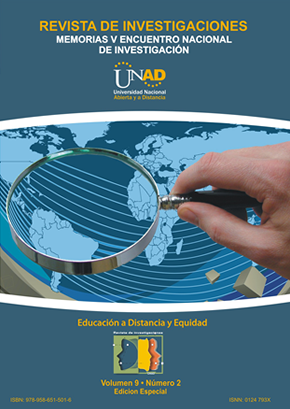Cuando la REVISTA DE INVESTIGACIONES UNAD recibe la postulación de un original por parte de su autor, ya sea a través de correo electrónico o postal, considera que puede publicarse en formatos físicos y/o electrónicos y facilitar su inclusión en bases de datos, hemerotecas y demás sistemas y procesos de indexación. REVISTA DE INVESTIGACIONES UNAD autoriza la reproducción y citación del material de la revista, siempre y cuando se indique de manera explícita el nombre de la revista, los autores, el título del artículo, volumen, número y páginas. Las ideas y conceptos expresados en los artículos son responsabilidad de los autores y en ningún caso reflejan las políticas institucionales de la UNAD
Diseño y evaluación de sistemas de polinización entomológica (passiflora edulis) en el Valle del Magdalena, Tolima
The passion fruit is used as a prime material for different products. For the last two years, about 500 Ha of crops have been harvested in the Magdalena Valley, an important source of work for the region people.
However, the passion fruit has a natural condition of auto sterilization. Manual polinization is needed. The efficiency is too low because the crops become too small. This scientific information points to the entomologic polinization systems, which are best for the passion fruit. Also the scientists confirm that the natural polinization of the crops come from both the carpenter bee (Xilocopa lachnea) and African bee (Apis mellifera).
This project utilizes two entomologic polinization systems in order to compare the manual polinization. It will be evaluate the efficiency of polinization, the crop’s quality and weight, as well as management costs.
The two entomologic polinization systems will be located in El Espinal and In Guamo (both cities of Tolima Department) about 10 Ha passion fruit crops each area. Also provide with a dispersion center which is a cube 4 meters edge, cover with black net, hermetic in order to control de insects and its flowers access.
The methodology depends of the species and the biological cycle of the passion fruit flower. For the carpenter bees, it will be necessary to keep the humidity through a drop water system
and feeding supplies. For the African bees, be recollected the pollen will be recollected and sprayed afterwards during the opening flower.
When the polinization is successfull, the passion fruit flower will be marked in order to evaluate the becoming crops with the parameters such as shape, size, color and weight, and compare
these parameters with those that used manual polinization. The parameters will be taken in a 90 day period after the adaptation period of the colonies finishes, in each case about 20 days.
The goal of this project is to evaluate the three polinization methods for a profitable and sustainable agriculture. This tries to find a better harvest of passion fruit that contributes to crops improvement, and environmental impact. Humanity has abused the use of agrochemicals and bees, so we have to fix this before it is too late.




